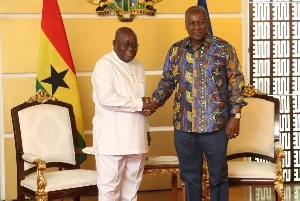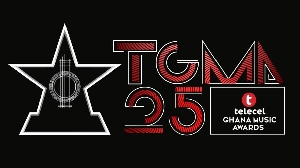General News of Thursday, 14 February 2019
Source: yen.com.gh
7 facts that prove Akufo-Addo is managing Ghana’s economy better than Mahama
From the days of Kwame Nkrumah, the prevailing economic conditions in the country have always been a key factor in determining how Ghanaians rate the performance of government.
This way of judging the government of the day's performance has become entrenched and highly debated since the beginning of the Fourth Republic in 1993.
In all of such debates, one thing has always been very common. There is a polarity between the government of the day and the leading opposition (between NPP and NDC depending on who is in and out of power).
While the government will tout its economic and other achievements, the opposition will always discount with arguments like the touted economic success is not reflecting in the pockets of the people.
This was clearly manifested in the run-up to the 2016 elections when the NDC claimed former president John Mahama had done marvellously well.
Their listed achievements were shot down by the NPP whose then-vice presidential candidate tagged Mahama as incompetent and described the economy as one built on a foundation of straw.
Bawumia and the NPP's description of the Mahama economy seemed to have resonated with Ghanaians and they were massively voted into power.
Two years into the NPP's administration, Mahama and his NDC are shouting on top of their voices that this is the worst economy ever and have even tried to reversely foist the incompetent tag on Akufo-Addo's government.
So the question is, between the Akufo-Addo-Bawumia and the Mahama-Amissah-Arthur governments who have been the better managers of Ghana's economy?
Obviously, such a question can never be answered without facts and figures else it will not be objective.
YEN.com.gh has put together this list of official statistics from the Ghana Statistical Service (GSS) and the Bank of Ghana that compares the performance of the two governments to end the debate as of now.
1. Economic Growth Rate (Annual GDP):
The Economic Growth Rate (EGR) is the rate at which a nation's Gross Domestic Product (GDP), the market value of all the goods and services produced in the country in a particular time period, grows from one year to another.
In 2016, Ghana's GDP was 42.80 billion dollars with a 3.7 per cent increase in EGR. Akufo-Addo's first year in office saw the GDP rise to 47.33 billion dollars with an 8.5 per cent EGR increase.
The last figures from the GSS indicate that the EGR for the last quarter of 2018 was 7.4 per cent.
2. Inflation rate:
Inflation in simple term means the general level of prices is going up. The higher the percentage the lesser your money.
If one has one cedi to spend, for instance, a 10 per cent inflation would mean they can really buy an item worth 90 pesewas as at the time inflation was zero per cent.
At the end of Mahama's tenure in 2016 was 17.5 per cent. The Akufo-Addo government brought the figure down to 12.4 per cent in 2017. In 2018, inflation was pegged at 9.47 per cent, statistics from the GSS indicate.
3. Fiscal deficit:
Simply put, the fiscal deficit is the difference between total revenue and total expenditure of the government.
According to the International Monetary Fund (IMF), in 2016, Ghana's fiscal deficit was 9 per cent of GDP.
The figure reduced to 5.9 per cent of GDP in 2017 and was 2.8 per cent by the middle of June 2018 and well within the 4.5 per cent that was projected for 2018.
4. Debt-to-GDP ratio:
The debt-to-GDP ratio is the ratio of a country's public debt to its gross domestic product (GDP).
This reveals what a country owes as compared to what it produces. It is used as an indicator for a country's ability to pay back its debts.
Ghana's debt-to-GDP which stood at 73.1 per cent in 2016, dropped to 69. 5 per cent in 2017. According to the 2019 Budget statement, debt-to-GDP ratio and stood at 67.3 per cent by June 2018.
5. Monetary Policy Rate (Interest rates):
The Monetary Policy Rate (MPR) simply refers to how the Bank of Ghana controls interest rates.
By setting a low policy rate, commercial banks are bound to reduce their lending rates making credit (loans) more accessible and affordable.
The Mahama government left office with the MPR set at 25.5 per cent. One year after taking office, Akufo-Addo's government reduced the MPR to 20 per cent.
The rate is pegged at 16 per cent as of February 13, 2019. Also, interest rates on the 91-day treasury bills, which is literally government borrowing from local banks, has declined from 16.8 per cent in 2016 and now stands at 14.7 per cent.
This means the Akufo-Addo government had reduced the cost of loans and government borrowing from local banks to allow credit to go to the private sector easily.
6. Balance of Trade:
The Balance of Trade (BOT) is the difference between the value of a country's imports and exports over a stipulated period.
A country that imports more goods and services than it exports in terms of value will have a trade deficit and the other way round will have a trade surplus.
BOT is known to be one of the key ways to measure the strength of a country's economy. By June 2016, Ghana had recorded a deficit of $1.4 billion.
This, according to the 2019 Budget statement, was improved significantly to a surplus of $1.1 billion as at June 2017 and another surplus of $1.1 billion as at June 2018.
This means the current government has strengthened Ghana's trade position with the rest of the world.
7. Gross International Reserves (GIR):
The Gross International Reserves are a country's “external assets”—including foreign currency deposits, bonds, gold, among others held by its central bank.
As at the end of December 2016, Ghana had 6.2 billion dollars which translates into the amount needed for only 3.5 months of imports. Fast forward to the middle of 2018, it had been improved to 7.3 billion dollars which is 3.9 months of imports.
Looking at these statistics, it is quite clear that Akufo-Addo's government is managing the economy better than the Mahama administration.











